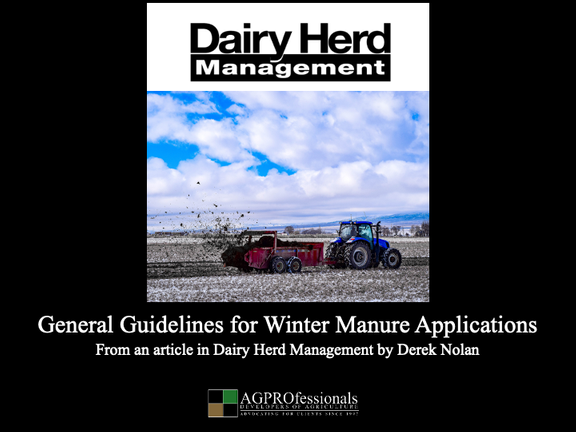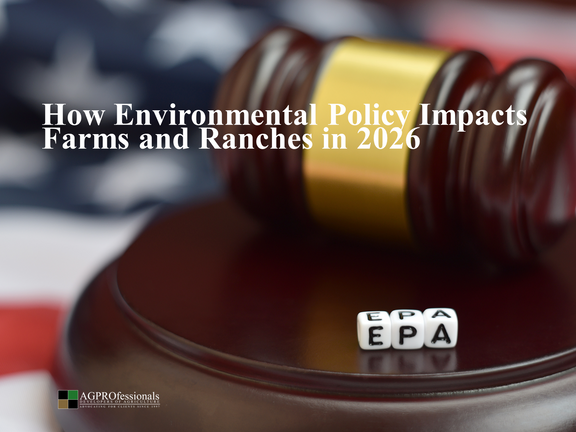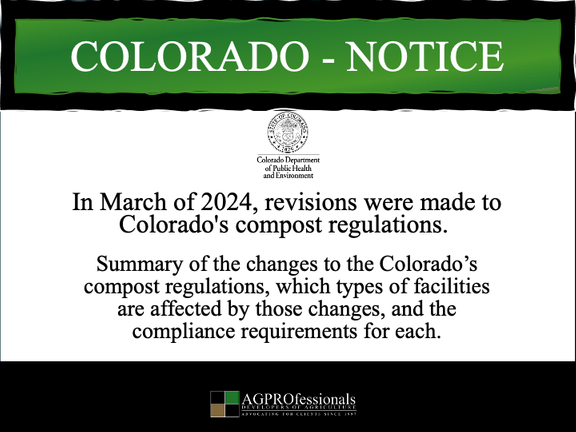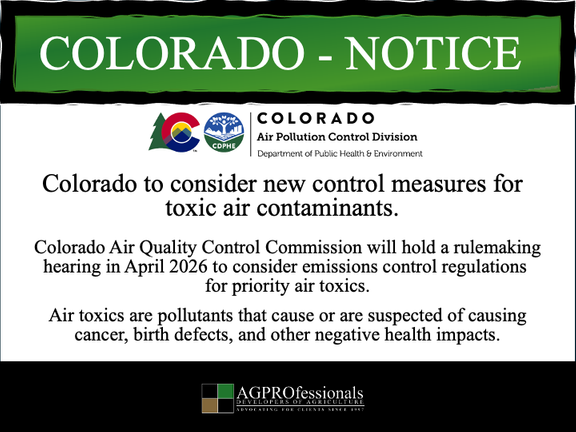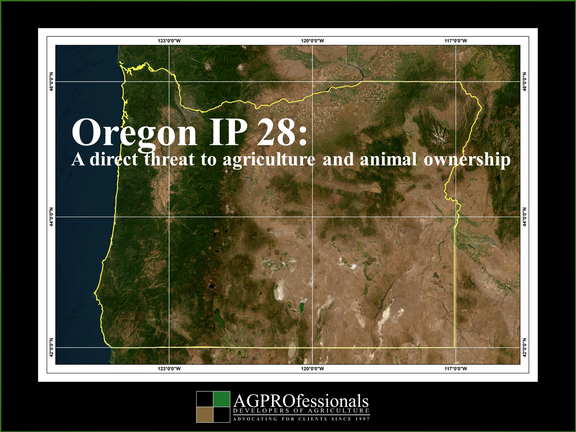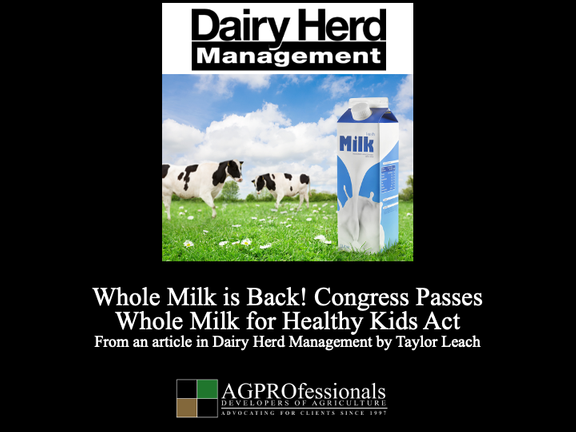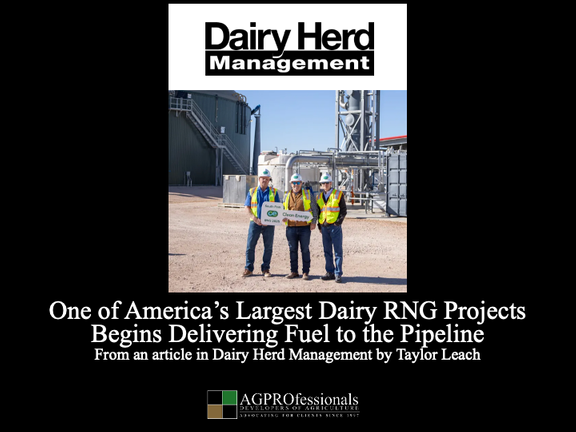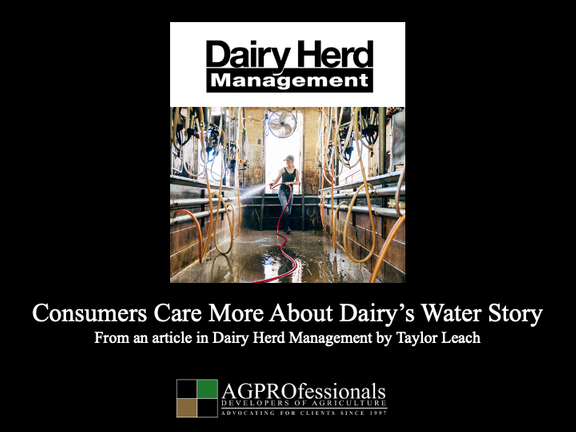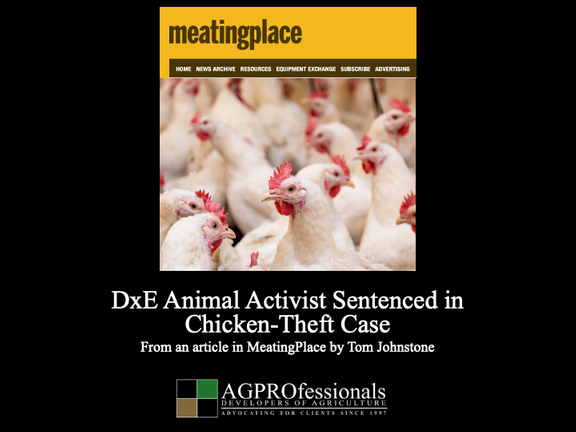Articles and Information
News and Information About Agriculture
Search applies to visible posts only. Load more to expand search results.
General Guidelines for Winter Manure Applications
From an article in Dairy Herd Management by Derek Nolan
Winter weather arrived early here in the Midwest. Not only did it start early, but we also experienced large fluctuations in temperature and conditions. We saw subzero temperatures and accumulating snow before Thanksgiving, then temperatures in the 60s the week of Christmas. Winter weather can make manure applications very tricky. Each state and local government has regulations for winter manure application. General guidelines can help prevent runoff and nutrient loss, and protect water sources.
Create a Buffer
Most regulations on manure application aim to protect natural water sources. One simple way to help prevent runoff into streams, rivers, and lakes is to create barriers. Maintaining a buffer around surface water, tile inlets, and waterways has been shown to significantly reduce runoff. Research indicates that a 200-foot buffer can decrease nutrient runoff by 80% to 90%. Overall, runoff volume can be reduced by 35% to 90%.
Consider Crop or Residue Cover
Spreading on bare ground can lead to increased runoff. Using crop cover, either with cover crops or crop residue from fall harvest, can significantly reduce runoff. Crop residues or the presence of cover crops as the surface begins to thaw give manure nutrients something to adhere to. Research shows that cover crops can reduce runoff by 40% to 100%, depending on field, crop, and environmental conditions. Fields with less than 25% crop residue tend to have a higher risk of runoff. Low-yielding soybeans and fields used for corn silage often have less than 25% crop cover during winter months. Spreading on fields with cover crops, hay, or pastures would allow for more nutrient absorption.
moreHow Environmental Policy Impact Farms and Ranches in 2026
AGPROfessionals News Desk
Your Voice Matters: How Environmental Policy Impacts Farms and Ranches in 2026
Environmental policy is not just theoretical for farmers and ranchers. It consists of rules and interpretations that can impact land values, operational choices, permitting timelines, and long-term planning. Throughout the U.S., producers are navigating a changing regulatory landscape that will affect everything from water management to compliance costs to the speed at which they can implement improvements.
In 2026, several specific legislative and regulatory developments are leading the way, presenting both challenges and opportunities for rural America. Understanding these policies and their real-life implications is essential for any agricultural operation’s strategic planning.
Water Regulation: The Ongoing “WOTUS” Debate
One of the most significant and persistent regulatory issues for agriculture is the definition of “waters of the United States” (WOTUS) under the federal Clean Water Act (CWA). This definition determines which water features are subject to federal oversight and permitting requirements, with potentially significant compliance implications for everyday farm activities.
moreSummary of the changes to Colorado’s compost regulations
By Colorado Department of Health and Environment Environmental Protection Specialist Jace Driver.
In March of 2024, revisions were made to Colorado's compost regulations (Section 14 of the Solid Waste Regulations) with the primary intention of increasing the opportunities for food waste composting via increased allowable volumes at Conditionally Exempt Small Quantity facilities, and opening up food waste composting to certain Class I facilities. However, in addition to these changes, other revisions were made that added finished compost testing and storage requirements, as well as a new training requirement for some operations. These changes impact both new and existing facilities.
In order to facilitate compliance with these revisions, the following is a summary of the changes to the regulation, which types of facilities are affected by those changes, and the compliance requirements for each.
Section 14.6 (D) Finished Compost Testing
Facilities: All that distribute finished compost offsite (CESQ, Class I, II, and III)
Revision: All finished compost must now be tested for both biological indicators, fecal coliform and salmonella. Previously it was one or the other.
moreColorado to consider new control measures for toxic air contaminants
During its December meeting, the Colorado Air Quality Control Commission agreed to hold a rulemaking hearing in April 2026 to consider emissions control regulations for priority air toxics. By creating and proposing this rule, the Air Pollution Control Division will help carry out the requirements of House Bill 22-1244: The Public Protection from Toxic Air Contaminants Act.
The commission previously identified five priority toxic air contaminants: formaldehyde, benzene, hexavalent chromium compounds, ethylene oxide, and hydrogen sulfide. Air toxics are pollutants that cause or are suspected of causing cancer, birth defects, and other negative health impacts. The division’s proposed rule would require that certain sources of priority air toxic contaminants use measures such as new technologies, substituting less hazardous materials, and modifying processes to reduce emissions. The proposed sources are:
· Chrome plating and anodizing.
· Anaerobic digesters with manure feedstock.
· Asphalt or asphalt roofing product manufacturing.
· Sterilization facilities.
· Gas-fired stationary spark ignition engines.
· Combustion turbines.
moreOregon IP 28 - A Direct Threat to Animal Ownership and Agriculture
AGPROfessionals News Desk
Oregon Initiative Petition 28
Oregon Initiative Petition 28 (IP28) is a ballot initiative deceptively branded as the “People for the Elimination of Animal Cruelty Exemptions (PEACE) Act." It represents one of the most aggressive assaults on animal ownership, agriculture, and private property rights ever proposed through a state ballot initiative. Despite its carefully crafted title and emotionally charged messaging, IP28 is not about improving animal welfare. It aims to criminalize lawful animal use, dismantle food production, and promote a long-standing animal liberation agenda through voter confusion rather than legislative debate.
This initiative is not hypothetical. It is not fringe. It is real, organized, funded, and dangerous.
The Broader Agenda Is Not Hidden
Perhaps most revealing is the rhetoric of IP28’s own advocates. Campaign leaders have openly stated that the goal is not to improve animal care but to eliminate animal use entirely, including food, research, hunting, and breeding. This initiative is based on a radical ideological belief that humans have no legitimate right to use animals under any circumstances. That belief conflicts with modern agriculture, food security, wildlife management, and private property rights.
moreWOTUS Comment Submitted on Behalf of AGPROfessionals' Clients
AGPROfessionals Advocacy and Engineering Teams
On December 18th, AGPROfessionals submitted a comment to the EPA and Army Corps of Engineers regarding the updated WOTUS rules. Below is the comment submitted.
We encourage producers and producer groups to submit their own comments in support of the updated rules. It is critical that they hear from you.
The comment period ENDS on January 5th, 2026.
The link to submit a comment directly on the Federal website can be found HERE
To read the document details posted on the Federal website, click HERE
To read comments submitted by others, click HERE
AGPROfessionals Comment
Proposed Rule Revising the Definition of “Waters of the United States” (WOTUS). Submitted on behalf of AGPROfessionals and our Agricultural Clients
Date: December 18, 2025
To Whom It May Concern:
AGPROfessionals appreciates the opportunity to comment on the Environmental Protection Agency (EPA) and U.S. Army Corps of Engineers’ proposed rule revising the definition of “waters of the United States” (WOTUS). We support the Agencies’ efforts to bring the rule into alignment with the U.S. Supreme Court’s decision in Sackett v. EPA, which restored necessary constitutional and statutory limits on federal jurisdiction.
moreWhole Milk is Back! Congress Passes Whole Milk for Healthy Kids Act
From an article in Dairy Herd Management by Taylor Leach
Congress has approved the Whole Milk for Healthy Kids Act, marking a major shift in federal school nutrition policy and reopening the door for whole and reduced-fat milk in school meal programs. The legislation reflects growing consensus around the nutritional value of milk at all fat levels and underscores the impact of sustained, bipartisan advocacy.
“Today we will restore students access to a wide variety of milk options assuring students have the necessary nutrients to learn and to grow, says Rep. Glenn Thompson, R-Pa., a leading supporter of the bill since its introduction. “I have worked for a decade to restore whole milk to our school cafeterias, which have been limiting healthy choices for students, but that changes today.”
He emphasized the importance of choice in school meals, noting that whole milk is a key part of a balanced diet for students.
“Whole milk is an essential building block for a well-rounded and balanced diet, and students should have the option to choose the milk they love. I am proud that my bill, the Whole Milk for Healthy Kids Act, passed the House today and now heads to President Trump’s desk for his signature,” Thompson added.
moreOne of America’s Largest Dairy RNG Projects Begins Delivering Fuel to the Pipeline
From an article in Dairy Herd Management by Taylor Leach
Clean Energy Fuels Corp. has brought its newest renewable natural gas (RNG) project online at South Fork Dairy in Dimmitt, Texas, marking a major addition to the nation’s RNG supply. The company confirmed the facility is now producing pipeline-quality gas and injecting it into the interstate natural gas system.
South Fork Dairy is home to 16,000 cows and now ranks among the country’s largest RNG sites. At full capacity, it will generate about 2.6 million gallons of RNG each year by processing up to 300,000 gallons of manure daily through four anaerobic digesters and advanced gas-cleaning technology.
Clean Energy fully financed the $85 million build, which broke ground in July 2024 and will receive all RNG produced at the site.
“The requirements to reach production and injecting milestones were extremely stringent, and we are incredibly proud of the team for getting our seventh RNG facility online, on time and on budget. It’s no small feat,” says Clay Corbus, SVP at Clean Energy. “The completion of the project at South Fork is particularly special because not only is it a major step forward in building our low-carbon RNG supply to ensure we have the volumes needed to meet the growing fleet demand, but we were able to work side-by-side with such a remarkable dairyman in Frank Brand.”
moreConsumers Care More About Dairy’s Water Story
From an article in Dairy Herd Management by Taylor Leach
Dairy farmers are under the spotlight when it comes to water use, with consumers wanting more transparency than ever. For producers, managing this vital resource means balancing production needs with sustainability and regulatory expectations.
Tara Vander Dussen knows this all too well. The former environmental consultant and current co-host of the “Discover AG” podcast has spent much of her career helping farms navigate water regulations and sustainability challenges. She has also faced these pressures firsthand on her own dairy in New Mexico.
“Water is literally our limiting resource,” she says. “Conversations about the future of dairy revolve around how we access, use and conserve water.”
On an episode of “The Dairy Podcast Show,” Vander Dussen discussed why tracking and managing water is essential for dairies, noting that sharing these practices with consumers helps build trust.
Tracking and Cutting Water Use
Improving sustainability begins with understanding exactly how much water a dairy uses. Tracking provides a clearer picture of inefficiencies, helping farmers make smarter decisions.
“The first step [to improving water management] is knowing your numbers,” Vander Dussen says. “Through your farm’s permitting process, you can figure out how many gallons per cow per day you actually use. That baseline helps you see where water is going and where it might be wasted.”
moreDxE Animal Activist Sentenced in Chicken-Theft Case
From an article in MeatingPlace by Tom Johnstone
A judge in Sonoma County, Calif., sentenced an animal activist convicted of stealing four chickens from Petaluma Poultry in 2023 to 90 days, according to a report by the Press Democrat.
The sentence requires Direct Action Everywhere (DxE) member Zoe Rosenberg to serve 30 days in jail and 60 days through a jail-alternative program, followed by two years of probation. She is to turn herself in by Dec. 10.
Sonoma County Superior Court Judge Kenneth Gnoss also ordered Rosenberg to stay at least 100 yards away from the Petaluma Poultry facility, which is owned by Perdue Farms.
In October, a jury found Rosenberg guilty of one count of felony conspiracy and three misdemeanors related to breaking into the plant and stealing chickens as part of what she and DxE contends are rightful rescues of allegedly abused animals.
Rosenberg read a statement, not expressing remorse for her actions but for failing to rescue more chickens, according to the report, which quoted Gnoss as saying, “Not once did I hear you say you’re sorry for your criminal conduct.”
more
